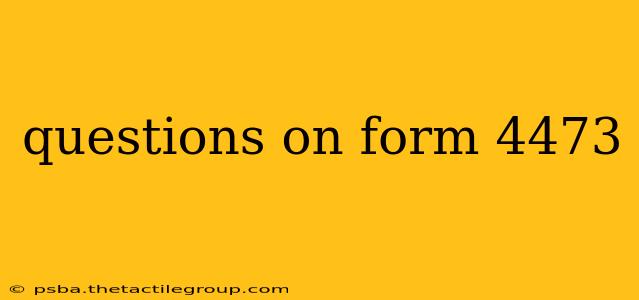The ATF Form 4473, officially titled "Firearms Transaction Record," is a crucial document in the US firearms acquisition process. It's a complex form, and many prospective firearm owners have questions about completing it accurately and efficiently. This guide aims to address some of the most common queries surrounding ATF Form 4473, ensuring a smoother and more informed experience for responsible gun owners.
Understanding the Purpose of Form 4473
Before diving into specific questions, it's essential to understand the form's purpose. The ATF Form 4473 is the legal record of a firearm transaction between a licensed firearms dealer (FFL) and a purchaser. It's designed to ensure compliance with federal laws regarding firearm sales and to prevent prohibited persons from acquiring firearms. Accurate completion is mandatory, and providing false information carries severe legal consequences.
Frequently Asked Questions about ATF Form 4473
Question 1: What information is required on Form 4473?
The form requests extensive personal information, including your full name, address, date of birth, and social security number. It also delves into your criminal history, mental health status, and history of drug use. Importantly, you are required to truthfully answer questions regarding whether you are a prohibited person under federal law. Failing to disclose pertinent information is a serious offense.
Question 2: What constitutes a "prohibited person"?
Federal law prohibits certain individuals from possessing firearms. This includes individuals convicted of a felony, those with specific domestic violence misdemeanor convictions, those subject to certain restraining orders, unlawful users or addicts of controlled substances, and those dishonorably discharged from the armed forces. The form explicitly asks about these disqualifying factors. Understanding these restrictions is crucial before attempting to purchase a firearm.
Question 3: How do I answer questions about my mental health history?
This section requires honesty and careful consideration. If you have a history of mental health issues, consult with a legal professional to understand how it might affect your ability to legally purchase a firearm. Providing inaccurate information can lead to serious legal repercussions.
Question 4: What if I make a mistake on Form 4473?
If you realize a mistake after submitting the form, immediately contact the FFL dealer. They may be able to correct minor errors; however, significant mistakes may necessitate starting the process over.
Question 5: What happens after I complete Form 4473?
The FFL dealer will retain a copy of the completed form. The dealer will then conduct a background check through the National Instant Criminal Background Check System (NICS). You will be notified of the results of the background check. This process can take a few minutes or several days, depending on the circumstances.
Question 6: Can I change my answers after submitting the form?
No. Once submitted, you cannot alter your answers. Accuracy is paramount.
Navigating the Complexities: Seeking Professional Advice
Completing ATF Form 4473 correctly is critical. If you have any doubts or uncertainties, it's always advisable to seek guidance from a legal professional experienced in firearms law. Understanding your rights and responsibilities as a firearm owner is vital. This information is for educational purposes only and should not be considered legal advice. Always consult with legal counsel for specific guidance.

